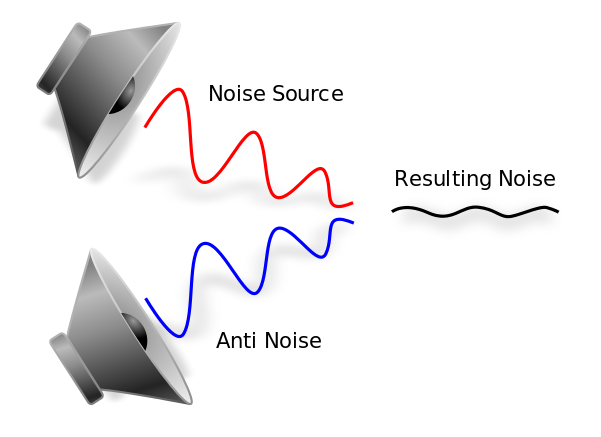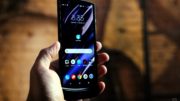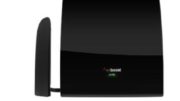The first time I tried headphones with active noise cancellation, I fell in love. In the last seven years, I’ve taken them on planes, on car trips, and even to jury duty. I use them in the office. I keep them with me whenever, because you never know when a loud truck is going to park outside or whatever. Those things are pure magic, worth what I paid for them.
How active noise cancellation works
Active noise cancellation works off a principle that doesn’t seem like it would make sense. If you take a sound, and play back another sound that is its mathematical opposite (more on that in a second) then both sounds go away. All I can tell you is, it works.
Sounds are really complex pressure waves; half the time they’re “up” meaning positive pressure, half the time they’re “down” meaning negative pressure. All you need to do to make them go away is more or less instantly create a wave that is up when the original wave is down. Of course, “all you need to do” makes it seem easy, when it actually takes complex, fast microprocessors to make this happen. If you create the “anti-sound” a fraction of a second too late it will actually amplify the original sound and that’s not helping anyone.
What’s even cooler is that you can manipulate the wave so it blocks out some sounds and lets others in. You can stop the sound of cement mixers outside your door but let the sound of your coworkers or your computer in easily.
I use active noise cancellation a lot in my job, even though it’s not by nature a noisy environment, but the folks who really benefit are people in loud vehicles. Active noise cancellation works well to restore comfort in noisy situations.
Trust me, if you work in any sort of environment with low-frequency noise you’re going to want something with active noise cancellation. Most devices are tuned so that you’ll still be able to hear the important stuff around you without having to hear the loud noises that distract from your day. This makes them a lot better than plain hearing protectors which essentially cut you off from the world.
What active noise cancellation doesn’t do
Active noise cancellation doesn’t protect your hearing. What’s more it makes you more likely to tolerate loud noises for a long periods of time because much of the noise is cancelled out. If you are truly somewhere noisy for a long period of time, you’re going to want hearing protection. Hearing protection is much simpler. It’s just a way to block the sounds coming into your ears. This is the only way to ensure that your ears stay healthy. There’s really no way to restore your hearing once you lose it. You can use a hearing aid but even that can’t replace true hearing damage. It can only make the sounds you’re still capable of hearing louder.
For all the best in headphones and hearing protection, shop the great selection at Solid Signal.





